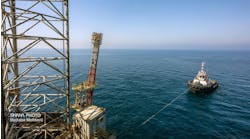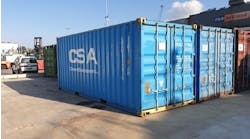Middle East emissions under the spotlight at ADIPEC 2023
Contributed by Xodus Group
Given the Middle East accounts for almost a third of the world’s oil production and about a fifth of its gas, it is unsurprising that countries in the region also lead the globe on greenhouse-gas emissions. Research from the World Bank put Qatar at the top of the carbon emissions per capita tree last year, with Kuwait, Bahrain, the United Arab Emirates (UAE) and Saudi Arabia all making the top 10.
The Gulf states are warning against a quick transition away from fossil fuels, with the UAE calling for a “mixed energy” approach that minimizes emissions without cutting hydrocarbons, a message that echoed around ADIPEC 2023. Under the banner of "Decarbonising. Faster. Together.," the conference offered an opportunity for companies to stake their claim to be at the forefront of emission-reduction initiatives.
But to make progress, businesses must understand the exact challenge ahead, establish and understand their emissions baseline, and review their operational performance to identify reduction opportunities—this requires experience and knowledge.
Energy assessment protocol
To support the global energy industry to take this first step in understanding its baseline, the emissions team at Xodus has developed an energy assessment protocol, one that has been implemented on more than 200 global sites, both offshore and onshore.
The in-house team works collaboratively with end clients to provide tailored solutions to optimize maintenance and boost the production and export of gas. These assessments typically take five days with the team physically inspecting the asset and talking to the site team to build a thorough picture of the emissions profile.
Workshops are carried out with the asset teams to pinpoint opportunities for reducing emissions; these opportunities are then assessed for their potential emissions savings, capex, potential production improvement and payback period along with other key success indicators. Energy assessments are an incredibly useful starting point for informing the creation of a decarbonization "master plan."
Simon Marshall, lead engineer within the Emissions and Climate Team at Xodus, said, “An in-depth understanding of a company’s existing emissions footprint is vital in identifying effective reduction and cost-saving opportunities. This baseline serves as the foundation for planning and ensures progress can be tracked. Typically, energy-saving opportunities of up to 20% are identified during the evaluations. Our experts then work closely with operational teams to really understand the client’s emissions portfolio and draw up a list of recommendations, including both quick wins and longer-term solutions.”
Energy assessments in action
Xodus previously completed a review for a Middle East operator’s fleet of offshore drilling rigs where more than 25 energy, emissions and cost-savings opportunities were identified per asset.
This represented a credible roadmap for a 60% reduction in total CO2 emissions for the offshore operator, of which a third of that was low-hanging fruit with low or no capex required. It also outlined potential overall cost savings of up to $28 million per year.
Marshall added, “We worked collaboratively with the client to deliver a study that has strengthened their understanding of Scope 1 emissions and set out a robust, achievable and sustainable emissions and energy efficiency framework to hit net-zero goals. Xodus has built up a wealth of knowledge and is using these learnings to support Middle East operators and deliver on the objectives of ADIPEC.”
Two-fold savings
For the client, the advantages of an energy assessment are two-fold: emissions savings and cost savings.
“Most gas that is not flared can then be sold," Marshall explained. "There is also a knock-on effect on production optimization and efficiency, increasing uptime and reducing the need for maintenance."
Natasha Howlett, emissions and climate manager with Xodus, added, “Ultimately, performing an energy assessment for your plant will pay for itself. If we could develop a commercial model, which would allow us to claim even 1% of the cost savings we identify during an energy assessment, we’d have all retired to the Caribbean by the age of 40; that is how confident we are in our methodology!”
Xodus Group is exhibiting at booth 8450 at ADIPEC this week.
Article references available upon request.
10.05.2023





